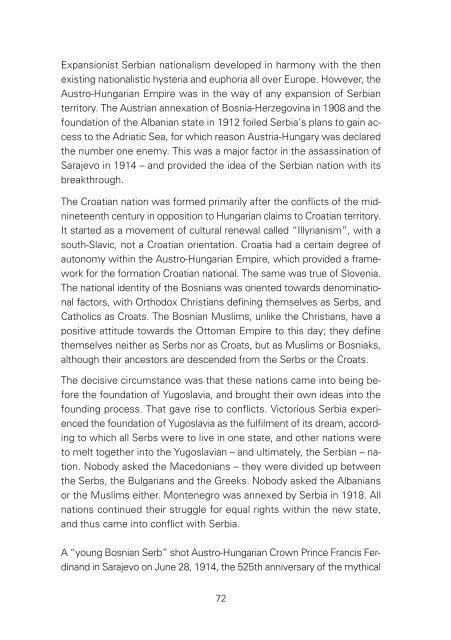The Contribution of Women to Peace and Reconciliation
The Contribution of Women to Peace and Reconciliation
The Contribution of Women to Peace and Reconciliation
Create successful ePaper yourself
Turn your PDF publications into a flip-book with our unique Google optimized e-Paper software.
Expansionist Serbian nationalism developed in harmony with the then<br />
existing nationalistic hysteria <strong>and</strong> euphoria all over Europe. However, the<br />
Austro-Hungarian Empire was in the way <strong>of</strong> any expansion <strong>of</strong> Serbian<br />
terri<strong>to</strong>ry. <strong>The</strong> Austrian annexation <strong>of</strong> Bosnia-Herzegovina in 1908 <strong>and</strong> the<br />
foundation <strong>of</strong> the Albanian state in 1912 foiled Serbia’s plans <strong>to</strong> gain access<br />
<strong>to</strong> the Adriatic Sea, for which reason Austria-Hungary was declared<br />
the number one enemy. This was a major fac<strong>to</strong>r in the assassination <strong>of</strong><br />
Sarajevo in 1914 – <strong>and</strong> provided the idea <strong>of</strong> the Serbian nation with its<br />
breakthrough.<br />
<strong>The</strong> Croatian nation was formed primarily after the conflicts <strong>of</strong> the midnineteenth<br />
century in opposition <strong>to</strong> Hungarian claims <strong>to</strong> Croatian terri<strong>to</strong>ry.<br />
It started as a movement <strong>of</strong> cultural renewal called “Illyrianism”, with a<br />
south-Slavic, not a Croatian orientation. Croatia had a certain degree <strong>of</strong><br />
au<strong>to</strong>nomy within the Austro-Hungarian Empire, which provided a framework<br />
for the formation Croatian national. <strong>The</strong> same was true <strong>of</strong> Slovenia.<br />
<strong>The</strong> national identity <strong>of</strong> the Bosnians was oriented <strong>to</strong>wards denominational<br />
fac<strong>to</strong>rs, with Orthodox Christians defining themselves as Serbs, <strong>and</strong><br />
Catholics as Croats. <strong>The</strong> Bosnian Muslims, unlike the Christians, have a<br />
positive attitude <strong>to</strong>wards the Ot<strong>to</strong>man Empire <strong>to</strong> this day; they define<br />
themselves neither as Serbs nor as Croats, but as Muslims or Bosniaks,<br />
although their ances<strong>to</strong>rs are descended from the Serbs or the Croats.<br />
<strong>The</strong> decisive circumstance was that these nations came in<strong>to</strong> being before<br />
the foundation <strong>of</strong> Yugoslavia, <strong>and</strong> brought their own ideas in<strong>to</strong> the<br />
founding process. That gave rise <strong>to</strong> conflicts. Vic<strong>to</strong>rious Serbia experienced<br />
the foundation <strong>of</strong> Yugoslavia as the fulfilment <strong>of</strong> its dream, accord -<br />
ing <strong>to</strong> which all Serbs were <strong>to</strong> live in one state, <strong>and</strong> other nations were<br />
<strong>to</strong> melt <strong>to</strong>gether in<strong>to</strong> the Yugoslavian – <strong>and</strong> ultimately, the Serbian – nation.<br />
Nobody asked the Macedonians – they were divided up between<br />
the Serbs, the Bulgarians <strong>and</strong> the Greeks. Nobody asked the Albanians<br />
or the Muslims either. Montenegro was annexed by Serbia in 1918. All<br />
nations continued their struggle for equal rights within the new state,<br />
<strong>and</strong> thus came in<strong>to</strong> conflict with Serbia.<br />
A “young Bosnian Serb” shot Austro-Hungarian Crown Prince Francis Ferdin<strong>and</strong><br />
in Sarajevo on June 28, 1914, the 525th anniversary <strong>of</strong> the mythical<br />
72








